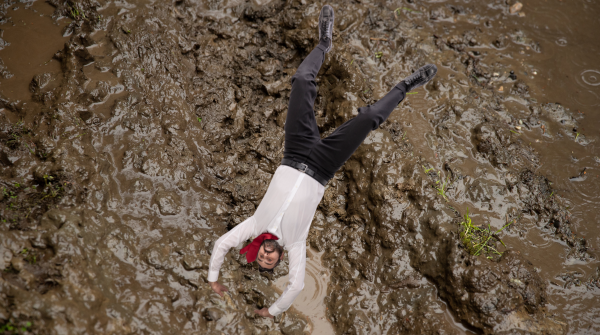What is Leadership Coaching and How Does it Work?
If you search “what is leadership coaching” in Google, you’ll get a bunch of different definitions, explanations, and examples. The lack of consensus around what it means is no surprise considering that professional coaching as a discipline only started to take off this millennium.
.png?width=683&height=384&name=what%20is%20leadership%20coaching%20(1).png)
And when you hear the word “coaching”, especially in mainstream American culture, you probably think of things like life coaching, fitness coaching, sports coaching, career coaching, etc. Those phrases alone can conjure up different thoughts, feelings, and ideas about what coaching is and what it looks like depending on your personal experiences.
Needless to say, the demand for coaching is on the rise - the coaching industry itself has almost doubled over the past 10 or 12 years, growing from $1B/year in 2010 to $2.85B in 2020.
We even find this demand for coaching crossing over into organizational and business spaces as well - particularly types of coaching related to performance, business, and leadership. What was once reserved only for senior leaders or executives (i.e. executive coaching) is now being considered as necessary for anyone in organizations, regardless of hierarchy.
We as a society have a new appreciation and focus on well being and its contribution to not just the culture of an organization but to the productivity and performance of its people which impacts tangible business outcomes and the overall success of an org. HR, People, Talent, and Learning & Development teams recognize this correlation and are seeking out ways to incorporate more leadership coaching into their companies.
So what is leadership coaching? What does it do for us? And how does it work in business?
Knowing that coaching is now a new, global focus, with increasing chatter and interest, it makes sense for us to pay attention to it a little bit more and try to understand what it is so that we can figure out how and if we want to use it, especially as individuals, businesses, and organizations in our post-pandemic world are struggling to navigate the new social, economic, and tech complexities wrought by recent global changes.
What is Leadership Coaching?
Leadership coaching is a tool that allows you to catalyze and maximize your development and impact as a person and as a leader. You can think of this tool as a conversational partnership between you (as an individual or a group of people) and a coach that helps you improve your leadership skill set AND mindset (which I like to think of as being part of your “operating system.")
Leadership Skill Set vs. Mindset
It is critical that we make a distinction here. Because growing in (technical and people) skill set without understanding and growing in mindset can sometimes slow people down and hinder them from becoming the effective leaders they can be, which in turn impacts the effectiveness of organizations. While technical and people skills are important for leaders to have, there is an even more important factor that determines effectiveness: mindset and operating system. Your operating system is how you function. And mindset is a component of that and is basically your attitude - all the thoughts, beliefs, and feelings you have, which lead to how you approach life. It leads to how you operate. How you function. Some of which you know, and a LOT of which you don’t know.
For example, a leader who is highly skilled in operationalizing processes but lacks the confidence and self-awareness to effectively communicate and collaborate with others may struggle to influence peers, launch said processes, and lead their team effectively. On the other hand, a leader who may not have as much technical expertise in operationalization but has a strong growth mindset and is open to learning and adapting may be more effective in influencing peers and leading their team towards positive results.
Leadership Skill Set vs. Mindset Examples

So what’s the point in knowing how to have hard conversations or put together a strategic plan if you believe that your way is the right way and that people are lazy? That thought combination won’t make a strong, effective leader.
A big part of leadership coaching is helping you uncover what those thoughts and beliefs are that may be getting in the way of you being the effective leader you want to be AND also discovering and accessing strengths you may never knew you had. Knowing and understanding how you operate is the key in helping you advance your leadership skills.
Personal Knowledge
Since our mindsets are based on our attitudes and attitudes are based on thoughts and feelings, there’s a good portion of that knowledge that we are and aren’t aware of - that’s why mindset is at times, more important than other leadership skill sets.
We're all developing, evolving, and growing at our own pace.
Most of the time, what slows down our development, what keeps us from breaking into the next level of growth, or from being happy, living life fully, achieving goals, connecting with others, effectively leading teams, etc. is the stuff we didn’t know, we didn’t know about ourselves.
It helps to think how “knowledge” in our mindsets plays a role in our lives to really understand this.
We can think of personal knowledge as being 3 types:
- What you know, you know (Ex: I know how to multiply. I know how to automate emails. I know how to use Salesforce.)
- What you know, you don't know (Ex: I don't know differential calculus. I don't know how to code emails. I don't know how to resolve conflict on my team.)
- What you don't know, you don't know => BLANK. YOU DON'T EVEN KNOW WHAT'S HERE. These are the hidden thoughts, feelings, and ways of being. Our blind spots. These are the parts of you or your operating system that are influencing your life in ways you’re not aware of. They hold you back as you struggle to move forward. Or propel you forward without you even being aware. (Ex: People shouldn’t argue with their managers, everyone should work 9 to 5, I’m not good enough, speaking in front of a group of people makes my heart race and stops my train of thought, men are better than women in leadership roles, always pretend everything’s ok.)
And the funny thing about this 3rd type of knowledge is that it's the biggest part of the knowledge we carry and impacts both our mindsets and operating systems and hence a lot of what we think, feel and do!

Leadership coaching helps to illuminate your blind spots so that you can remove any blockers, tap into your strengths, choose and experiment with new ways of seeing, thinking, and doing as you deepen your learnings so that you can access a better, stronger, more empowered version of yourself resulting in improved mindsets, skill sets and abilities.
Why is Leadership Coaching Important?
Good leaders are essential for the success of any organization. Leaders help set the direction, vision, tone, environment, and culture of a company. They play key roles in building and managing strong, high-performing teams and are responsible for creating safe, positive, and supportive work environments for their people. And since effective leaders must have effective mindsets and skill sets, leadership coaching as a tool can help catalyze the personal and professional development needed to maximize impact, not just on their teams, but across the organization.
Better leaders means better clarity around goals and objectives, stronger communication, more trust, increased collaboration, adaptability, accountability, diversity, engagement, and productivity - which leads to stronger teams, reduced employee turnover, increased customer satisfaction and improvement in financial performance.
Great leaders = better people = higher performing teams = better business results.
Here are some stats for you:
- Coaching generates an ROI of between $4 and $8 for every dollar invested. That's an ROI of up to 700%
- Coaching combined with training boosts productivity by an average of 86% compared to 22% with training alone.
- Leadership coaching results in an average ROI of nearly 5.7 times the initial investment and a boost in average productivity by nearly 53%
How Does Leadership Coaching Work?
A leadership coach helps you (the “coachee”) identify and achieve professional goals through a structured and supportive process in one-on-one sessions. During these sessions, your coach creates a safe and judgment-free space for the you to explore your goals, understand how you function, figure out what works and doesn’t work, and identify any obstacles or limitations that may be holding you back.
Through a series of thought-provoking and creative exercises, the coach helps you to uncover your own potential, develop a more expansive and effective mindset along with new insights and strategies for achieving your goals. It is within this newfound awareness and expanded mindset that you can learn and practice new leadership skills and integrate those skills into your work and life.
So whether you want to get better at delegating responsibilities, strategic planning, working cross-functionally, driving revenue, resolving conflict, public speaking, etc. a leadership coach can help you BE the the kind of leader you want to be by helping you improve your mindset and skill set.
Leadership coaches essentially do 5 things:
- Create the environment - setting up a safe space for you to show up where they are fully present and focused only on you. They're trained to suspend all thought and judgment and allow you to fully exist and be seen and heard. Whatever happens here, stays here.
- Create structure - providing it for the entire coaching process including that of each session and the series of sessions or entire program that has been customized for you. They'll ensure there's clarity around what you want or need, why it matters, how to get there, how you'll know you got there, and what the next steps are for you.
- Observe - paying close attention (again, without judgment) to what you say and don't say. They look at your nonverbal communication, picking up on what's between the lines and the shifts in energy that you might not realize you're exhibiting. They'll reflect back things they notice and provide feedback.
- Challenge - asking simple, yet powerful questions that allow you to reflect and see things you hadn't seen before. Gently giving you space to tap into those blind spots and figure out what you want to do with them once they go from "what you didn't know, you didn't know" about yourself to what you now know.
- Give support and accountability - allowing you to constantly explore, reflect, understand, challenge, figure out next steps, and experiment with new ways of being and doing. They'll offer you tools along the way that help you expand your awareness and understanding - ones that you can take along with you in your life - choosing what you want to take on and how you want to change.
A leadership coach won’t tell you what to do. They’ll show you where to look, but they won’t tell you what to see. They’ll guide you, nudge you, think with you, and support you. They believe that you already have the answers inside you, they just help you find them.
How Do You Find a Leadership Coach?
Finding a leadership coach depends on a number of things like what you’re hoping to accomplish, your industry, company size, company goals/needs, budget, and whether or not it’s important to you that your coach is certified. Chemistry and fit also matter.
Some coaches are trained and certified through professional coaching associations. These associations should have online directories which can be searched by things like location, industry, experience, and specialization. The largest and most well-known coaching association is the International Coaching Federation or (ICF) which sets professional standards for coaching and offers credentialing for coaches. They have a thorough, global directory of certified coaches.
Most of the time you can find a leadership coach by asking other business leaders or HR folks for recommendations. (And of course, you can always Google.)
But finding them is just the first step. It’s important to have an initial conversation (aka discovery call) with a potential coach to chat about your goals, challenges, expectations, hear about the coach’s process or approach, ask questions and see if you’d be a good fit.
If you’ve made it this far and think coaching might work for you or for folks in your organization, go ahead and schedule a free, 30-minute discovery call with me to see how I can help you >
We’re all growing and evolving - whether we realize it or not. Some of us faster than others. Some of us deeper than others. Coaching allows us to go faster and deeper on our growth journey, helping us to see more, be more, do more and live more fully. And as leaders there is a lot more at stake - it helps us to influence more, guide more, and achieve more.

 By
By



